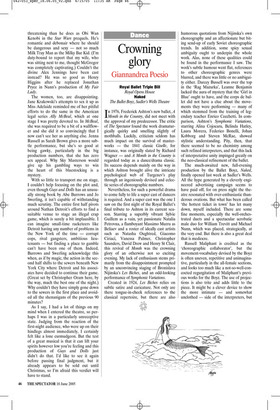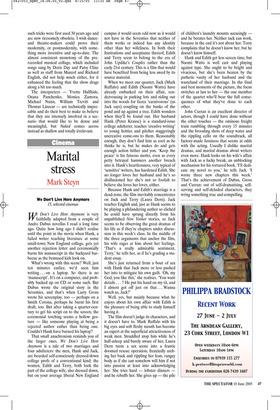Crowning glory
Giannandrea Poesio
Royal Ballet Triple Bill
Royal Opera House
Naked The Ballet Boyz, Sadler’s Wells Theatre In 1976, Frederick Ashton’s new ballet, A Month in the Country, did not meet with the approval of my predecessor. The critic of The Spectator found the work dramaturgically quirky and smelling slightly of mothballs. Luckily, criticism seldom has much impact on the survival of masterworks — the 1841 classic Giselle, for instance, was originally slated by Richard Wagner — and A Month in the Country is regarded today as a dance/drama classic. Its success depends mainly on the way in which Ashton brought alive the intricate psychological web of Turgenev’s play through an ingeniously devised and eclectic series of choreographic numbers.
Nevertheless, for such a powerful drama to come fully to life a super cast of dancers is required. And a super cast was the one I saw on the first night of the Royal Ballet’s final tribute to Ashton in its current season. Starring a superbly vibrant Sylvie Guillem as a vain, yet passionate Natalia Petrovna, a flamboyant Massimo Murru as Beliaev and a roster of ideally cast artists such as Natasha Oughtred, Giacomo Ciriaci, Vanessa Palmer, Christopher Saunders, David Drew and Henry St Clair, this revival of Month was the crowning glory of an otherwise not so exciting evening. My lack of enthusiasm stems primarily from the disappointment prompted by an unconvincing staging of Bronislava Nijinska’s Les Biches, and an odd-looking performance of Symphonic Variations.
Created in 1924, Les Biches relies on subtle satire and caricature. Not only are there tongue-in-cheek references to the classical repertoire, but there are also humorous quotations from Nijinska’s own choreography and an affectionate but biting send-up of early Soviet choreographic trends. In addition, some spicy sexual ambiguity ought to underpin the whole work. Alas, none of these qualities could be found in the performance I saw. The work’s subtle humour went flat, references to other choreographic genres were blurred, and there was little or no ambiguity either. Darcey Bussell was over the top in the ‘Rag Mazurka’, Leanne Benjamin lacked the aura of mystery that the ‘Girl in Blue’ ought to have, and the corps de ballet did not have a clue about the movements they were performing — many of which stemmed from the training of legendary teacher Enrico Cecchetti. In comparison, Ashton’s Symphonic Variations, starring Alina Cojocaru, Belinda Hatley, Laura Morera, Federico Bonelli, Johan Kobborg and Steven McRae, showed stylistic understanding. Pity, then, that there seemed to be no chemistry among such refined interpreters, and that this lack of interpretative unity impinged greatly on the neo-classical refinement of the ballet.
The much-awaited new, full-evening production by the Ballet Boyz, Naked, finally opened last week at Sadler’s Wells. All the hype generated by a cleverly engineered advertising campaign seems to have paid off, for on press night the theatre resonated with over-enthusiastic thunderous ovations. But what has been called ‘the hottest ticket in town’ has let many down, myself included. There are some fine moments, especially the well-orchestrated duets and a spectacular acrobatic male duo for William Trevitt and Michael Nunn, which was placed, strategically, at the very end. But there is also a great deal that is mediocre.
Russell Maliphant is credited as the ‘choreographic collaborator’, but the movement-vocabulary devised by the Boyz is often uneven, repetitive and unimaginative, particularly in the all-female sections, and looks too much like a not-so-well-concocted regurgitation of Maliphant’s previous works for the Boyz. The use of projections is also trite and adds little to the piece. It might be a clever device to show the more intimate — and somewhat unclothed — side of the interpreters, but such tricks were first used 30 years ago and are now tiresomely obsolete. I wish danceand theatre-makers could prove their modernity, or postmodernity, with something more inventive and up-to-date. The almost consistent monotony of the prerecorded musical collage, which included songs sung by Doris Day and Patsy Cline as well as stuff from Murcof and Richard English, did not help much either, for it enhanced the feeling that the show drags along a bit too much.
The interpreters — Yvette Halfhide, Oxana Panchenko, Monica Zamora, Michael Nunn, William Trevitt and Thomas Linecar — are technically impeccable and do their best to make us believe that they are intensely involved in a scenario that would like to be dense and meaningful, but Naked comes across instead as shallow and totally irrelevant.

















































 Previous page
Previous page